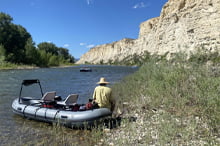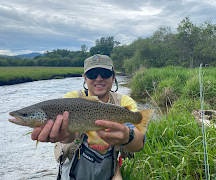No products in the cart.
Hatful of Hollow

The Underbelly of a Fine Town
By Joe Cusick
Like an ode to Salmon’s blue collar history, a loud WWII bomb siren goes off every day at noon, except Sundays. Before the town’s tourism industry got going, Salmon was primarily composed of cobalt miners and ranchers. The siren, originally a signal for workers to take their lunch breaks, became an anxious reminder for me that I’d overslept after closing and mopping the bar the night before.
My friend Jake, who had been managing the bar for the greater part of a year, set me up working there last summer and sharing a house with him next to the river. On the night of the solstice, we watched in the twilight from our backyard as an osprey swooped, dove, and weaved to catch large golden stoneflies from the sky.
Our lawn and house crawled with these insects, a staple food for the trout and birds living in this ecosystem. My father once told me that the act of swallowing a stonefly will bring a successful fishing season and help to produce a healthy river. So I did it, washing down the insect with warm, flat beer. In truth, I did it mostly to shock Jake.
Overall, my experience of Salmon that summer was very positive. I know that my impressions of the town were influenced by my work at the bar and interactions I normally would never have. But Salmon held a vibrant sense of community and was full of good people and good things. Everyone seemed to be in touch with each other’s day-to-day lives. The folks who frequented the bar were simply trying to cope, like us all, although I think heavy drinking by some of them was a poor choice.
My primary pastime, the way I coped during the summer, was fly fishing. Eastern Idaho is a tundra in the winter and a desert in the summer. Rattlesnakes hiss around prickly pear cacti while golden eagles prey on rodents they spot from high above the prairie. The Salmon and Lemhi Rivers converge here, creating an oasis in this rugged country.
Along the banks of the Salmon lies a jungle full of insects and wildlife. Often, I would catch myself focusing less on my fly and the feeding fish than on the hypnotic flow of the river around my legs. Here I could remind myself that we all are, at our core, animals: organic material trying to formulate and organize our world.
One of the memorable patrons at the bar was a man I’ll call Mark. He usually said he was doing well, he was happy, and once he mentioned he had met a beautiful woman while in the mountains near Goldbug Hot Springs. He added that unfortunately he was “getting too old for anything like that.”
This content is available for purchase. Please select from available options.
Purchase Only
Purchase Only


6 Responses to Hatful of Hollow
Tessa -
at
Loved this look into Salmon! I lived nearby for a summer and came into town often for groceries and laundry. It makes such an interesting place to have a health foods store and a bar with said sign on the same street. Great article Joe
Kelly Harwood -
at
What a beautiful essay Joe! Congratulations!!
Karen Foster -
at
I was born and raised in Salmon back in the late 60s to early 70s. The only item I see left out is that loggers, along with movers and ranchers, made up the population of Salmon before tourism hit the area. Logging was a very important industry in the area. There actually was a lumber mill located in town where the current Safeway is located.
Janet Tomita -
at
Your story brought back so many memories of growing up in
Salmon and then to have to leave at t he age of 18. I came back in 2010 and saw many changes but not in the way people still cared about each other. I soon turn 79 and it is people like me you should be interviewing. My grandparents came to Salmon during the gold rush in the late 1800s and I have many stories to tell. Janet Tomita
Holly Hutchinson -
at
The Owl Club.
Salmon is a logging and ranching town. It has tried to be other things since the closure of the mill, and industrial mining comes and goes, but when most of its people worked in logging, and that work was several generations deep, that’s when Salmon was alive. That’s when Salmon was able to support real businesses on Main Street— drug stores, clothing stores, a shoe store, furniture stores, a hardware store, a variety store, a saddle shop, a fisherman’s shop. It was a real town that served the needs of a large rural area. So many things have chipped away at that: Loss of the logging industry. The arrival of tourism. Subdividers. People willing to drive two hours to Costco for their groceries.
Methamphetamine.
The population there now is unrecognizable to me.
But, Salmon still has the only hospital for miles around.
And the Owl Club remains.
Ann Crawford -
at
I cried. I was the last teacher in Cobalt., my most favorite job of over 30 years in the classroom. Married a older man who lived in the Yellowjacket, spent 2 Winters snowed in with 4 children,.then twins the 2nd winter. I am now a widow but my memories of Salmon were rekindled from your ” story”. Thank you!